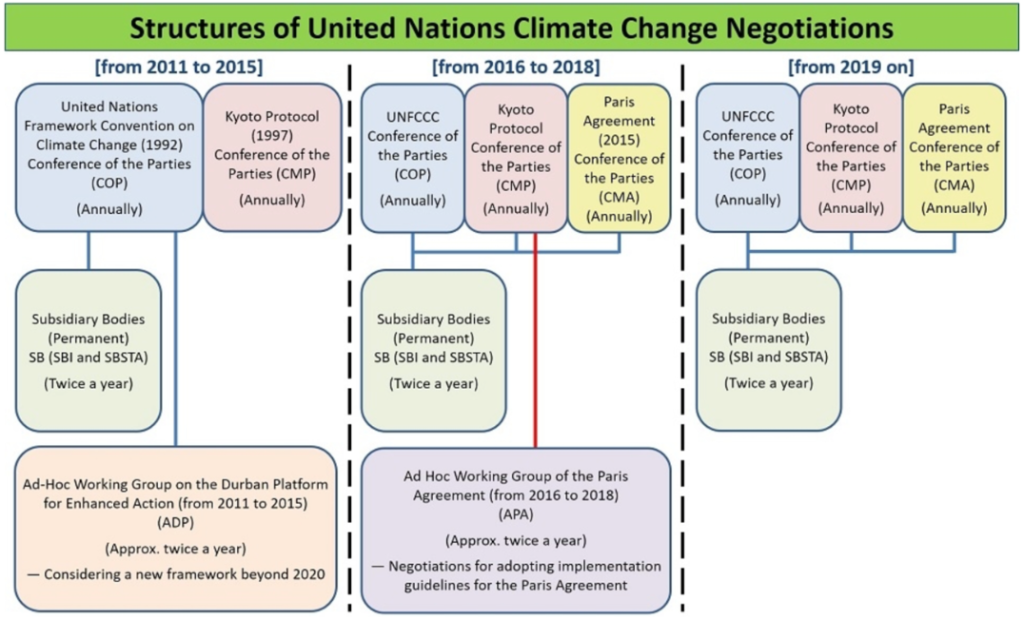From 2011 to 2015, the United Nations climate change negotiations were conducted in the Conference of the Parties on Climate Change (COP), the Conference of the Parties serving as the Meeting of the Parties to the Kyoto Protocol (CMP), the Subsidiary Bodies (SBs) and the Ad Hoc Working Group on the Durban Platform for Enhanced Action (ADP), which was set up to discuss the new framework beyond 2020. With the Paris Agreement, the Conference of the Parties was created as the Meeting of the Parties to the Paris Agreement (CMA), which joined the COP, the CMP and the SBs and, following the conclusion of the ADP, the Ad Hoc Working Group on the Paris Agreement (APA) was created, which finalised its work at the CMA1 (adapted from https://www.mofa.go.jp/ic/ch/page22e_000921.html).
According to the working version of Cabo Verde’s strategy for climate negotiations in the 2024-2025 biennium, the United Nations Framework Convention on Climate Change (UNFCCC), adopted in 1992, established an international environmental treaty with the aim of “stabilising greenhouse gas concentrations in the atmosphere at a level that would prevent dangerous anthropogenic interference with the climate system”.

Source: https://www.mofa.go.jp/ic/ch/page22e_000921.html
The Paris Agreement, adopted in 2015, represents an important step forward in mobilising a global response to the challenges of climate change, having set three long-term objectives:
- limit the increase in the global average temperature to well below 2.0°C and advance efforts to limit the increase to 1.5°C above pre-industrial levels;
- increasing the capacity to adapt to the impacts of climate change; and
- making all financial flows consistent with low-emission and climate-resilient development paths.
The COP brings together the signatory countries of the UNFCCC, the Kyoto Protocol and the Paris Agreement and is held annually to mobilise countries to sign agreements and make commitments to increase ambition and accelerate climate action.
COP28 took place from 30 November to 12 December 2023 at Expo City, Dubai, under the auspices of the Presidency of the United Arab Emirates and was the venue for the first Global Stocktaking (GST), the mechanism for reviewing global climate ambition every five years established by the Paris Agreement, reaching important conclusions on mitigation, adaptation, loss and damage and means of implementation.
COP29 will take place in Baku, Azerbaijan, from 11 to 22 November 2024 and COP30 will take place in Belém, Brazil, from 10 to 21 November 2025.
So what are the COP, SB, CMA, etc.?
| COP Conference of the Parties | The supreme decision-making body of the UNFCCC. All parties participate and analyse the implementation of the UNFCCC and take decisions. Typically meets once a year, alternating between the various continents |
| CMP Conference of the Parties as the meeting of the Parties to the Kyoto Protocol | All parties to the Kyoto Protocol participate and analyse the implementation of the Protocol and take decisions. The CMP is held once a year. |
| CMA Conference of the Parties as the Meeting of the Parties to the Paris Agreement | All parties to the Paris Agreement participate and analyse the implementation of the Agreement and take decisions. The CMA is held once a year. |
| SBs Subsidiary Bodies | There are two Subsidiary Bodies: (i) the Scientific and Technological Advisory Body (SBSTA) and (ii) the Implementation Body (SBI). SBSTA provides scientific and technological information and advice on the UNFCCC, the Kyoto Protocol and the Paris Agreement. The SBI assesses and analyses the actual implementation of the UNFCCC, the Kyoto Protocol and the Paris Agreement. The SBs are held twice a year, namely in June in Bonn and then with the COP |
| APA Ad Hoc Working Group on the Paris Agreement | The APA was a subsidiary body that was set up after the adoption of the Paris Agreement for its entry into force and to prepare for the first meeting of the CMA. The APA discussed the guidelines for implementing the Paris Agreement and ended its function when CMA1-3 was closed in December 2018. |
| ADP Ad-Hoc Working Group on the Durban Platform for Enhanced Action | ADP is a subsidiary body which was established to (1) discuss the framework which will be applied to all the countries from 2020 and to (2) discuss the enhancement of mitigation ambition by 2020. ADP finished its function in COP21 (end of 2015) when the Paris Agreement was adopted. |
